S.C. Skillman's Blog, page 55
May 11, 2015
Book Review (English Social History): “Through the Keyhole” by Susan C Law
It seems part of the psychological make-up of the English people to bestow power upon the wealthy and privileged; whilst at the same time depriving them of the right to privacy.
And as we’ve all recently seen in the General Election, you have to be tough to play for high stakes; winner takes all, and unsuccessful opponents lose everything.
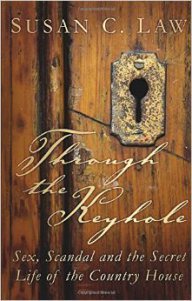
Through the Keyhole by Susan C Law
Today’s obsession with the private lives of celebrities and those “in high places” finds its parallel in Georgian and Regency England, where the public was hungry for moral lapses among the aristocracy. This fascinating and scrupulously researched book shines a spotlight onto a universal aspect of human behaviour – but the scholarly focus is upon how eighteenth century society reacted to it, thus enriching our knowledge of the social history of the time.
Aristocratic rakes are the stuff of novels set in Regency England. One of the most striking things about the book is how intensely the opinion-makers of the time wanted to hold on to the idea of “rank co-existing with honour”, despite all evidence to the contrary. Another outstanding aspect of Susan Law’s account is the hypocrisy of the society as the popular press indulged itself in moralising and judgementalism, along with minimal respect for confidentiality, slander and libel, thus feeding a voracious appetite by the public. But I was also surprised by the disregard that the adulterous aristocrats themselves paid to covering up their tracks, and their failure to have due regard to the ominipresence of their servants. Tumbled bedclothes, two dents in the bed, and hair powder on the pillowcases seem obvious tracks to cover up!
Susan Law examines the craze of the 1790’s for printed court reports of adultery trials, which continued through to the late 1830’s with the popularity of the “Crim Con Gazette”. She examines the changes that took place up until the 1832 Great Reform Act which altered the way the nation saw itself in terms of social hierarchies – opening up “previously unthinkable possibilities for the middle class”. Certainly in the early part of the period it is very noticeable that often “cuckolded” husbands (themselves equally guilty of adultery) might be awarded huge damages and then go on to an honourable career in high office, while adulterous women were far more likely to be “sent away” in shame and have their lives ruined.
Chief among the adulterers later on of course was the Prince Regent, and I was amused to read the opinion of Theresa, sister of the Earl of Morley, who wrote in a letter “’tis dreadful to think of the open profligacy of that Monster…. we must all go to the dogs should he ever unfortunately come to the throne.”
To the non-academic reader, the most interesting parts of this book are when the author gives accounts of specific cases, such as that of Lord Ellenborough and his young wife Jane. There are among these stories accounts that will draw a variety of different responses from the reader; for as the blurb points out, the different stories are passionate, scandalous, poignant and tragic.
A fascinating insight into eighteenth century social history, with plenty of material which will give us cause to reflect upon the preoccupations of today’s Britain as well.
Filed under: About Books I love, Authors I love, book reviews, Books, British Tagged: actors, adultery, aristocrats, book review, English, Georgian and Regency England, Regency novels, SC Skillman author, social history, Susan C Law, Through the Keyhole


May 4, 2015
A Journey through Golden Fields to Stratford-upon-Avon to see Classic Cars at the Motor Festival
Today I found myself in the driver’s seat once more (6 weeks after my hip operation) and joining the queue of cars heading into Stratford-upon-Avon.
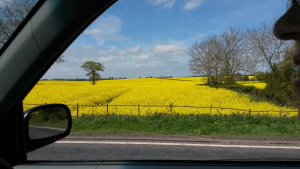
View of fields on the journey from Wariwck to Stratford upon Avon
The long traffic queues were because Stratford was hosting its annual Motor Festival today. So this gave Abigail plenty of opportunity to take photos of the lovely fields of rapeseed flowers on either side of us.
I cannot think of golden fields, sunshine and Shakespeare without being reminded that the short-lived nature of English sunshine, and the passing of time, are some of Shakespeare’s most beloved themes, constantly recurring in the Sonnets.
As I gazed at the fields I was reminded of the words Full many a glorious morning have I seen/flatter the mountain-tops with sovereign eye/kissing with golden face the meadows green/gilding pale streams with heavenly alchemy; and could imagine that Shakespeare felt just as I did, viewing the glorious landscape around Stratford-upon-Avon.

Stratford upon Avon Motor Festival 4 May 2015
Once in Stratford, we enjoyed the atmosphere of the motor festival.
All the way down Bridge Street and Henley Street and in front of the Royal Shakespeare Theatre, the Shakespeare Centre and the Shakespeare Birthplace were the kind of cars that I only know about because Jeremy, James and Richard have at one time or another taken them round the Top Gear track.
Gleaming paintwork, exquisite design and immaculate engines were on display, and the owners of these wonderful machines sat beside them at picnic tables, drinking red wine, and keeping a close eye on their showpiece.
I always love visiting Stratford-upon-Avon, for many reasons, and feel so lucky to live nearby.
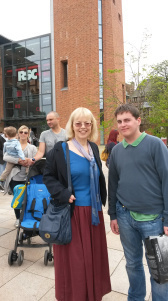
Sheila and Jamie in Stratford upon Avon
Filed under: Authors I love, Books, British, British landscape, English countryside Tagged: classic cars, glorious landscape, heavenly, imagine, lovely fields, motor festival, SC Skillman author, Shakespeare, Stratford-upon-Avon


April 27, 2015
Secret Gardens: The First Glimpse of the ‘Privy Garden’ at Kenilworth Castle for Elizabeth in 1575
I find this view of the Elizabethan Garden at Kenilworth Castle very evocative.
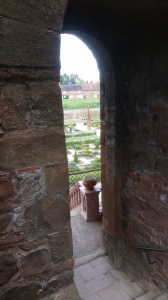
Approaching the steps down into the Elizabethan Garden at Kenilworth Castle
It would have been the view Elizabeth first saw when Sir Robert Dudley led her into the garden in 1575, hoping that this time she’d accept his proposal of marriage.
This first sight of the garden, glimpsed from the Keep, conjures up for me visions of secret gardens, of a lovely vision opening up unexpectedly from a dark approach.
Secret gardens are a strong archetype, a central image in my childhood reading.
They represent the Golden Age of children’s literature and this is reflected in a book I found on the subject.
The classic children’s writers who have touched upon this theme include Lewis Carroll, Kenneth Grahame, George Macdonald, Louisa May Alcott, Frances Hodgson Burnett, A.A. Milne and others whose books I have loved. No wonder, then, that this view immediately appealed to me when I visited Kenilworth Castle again today.
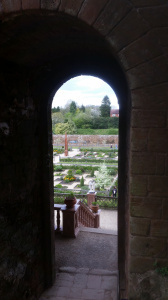
View from the Keep into the Elizabethan Garden at Kenilworth Castle
Filed under: About Books I love, Authors I love, book reviews, Books, British, buildings, creative writing, design Tagged: childhood classics, Elizabethan garden, Kenilworth Castle, lovely vision, SC Skillman author, secret gardens


April 20, 2015
The Creative Power of an Intense Group of People in the Hothouse Environment of a Writers Retreat
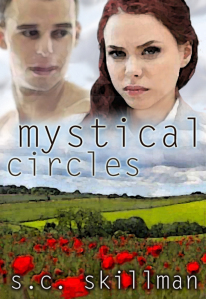
Mystical Circles by SC Skillman
I’ve now finished my series of Cave posts as new inspiration has intervened!
One of my fellow bloggers Lance Greenfield has just opened up thoughts of writers retreats by reblogging this post on the subject by Max Dunbar. Lance then went on to ask his own followers for their responses to Max’s thoughts, and whether it would be worthwhile for him to go on one of the many writers’ courses or retreats that are available here in the UK.
Part of my inspiration for my novel Mystical Circles was an Arvon Foundation poetry course which I attended at Totleigh Barton farmhouse in Devon. My fellow poets that week reflected the wide variety of characters to be found at a writers’ retreat in the UK – and in the story of Mystical Circles. Among these you may find – alongside whatever idiosyncracies you yourself may bring – several complex personalities; and your interactions with others, and your observations, form an inexhaustible source for a writer. And I believe it’s vital to write about people, no matter how deeply flawed, with love and empathy, never in a detached or critical spirit.
Below I list some of my favourite plays, books and films which have achieved this:
Unnatural Causes by PD James (detective novel set in a literary community)
Peter’s Friends (film directed by Kenneth Branagh and starring Stephen Fry and Hugh Laurie)
Abigail’s Party by Mike Leigh (brilliantly developed and improvised by playwright and actors and first broadcast by the BBC in 1977)
Heartbreak House by George Bernard Shaw (a group of people are invited to one of Hesione Hushabye’s infamous dinner parties, to be held at the house of her father, the eccentric Captain Shotover)
If you’re fascinated by group dynamics and it’s relevant to what you’re writing, then a writers retreat – a small group of intense people in a hothouse atmosphere – may be ideal for you!
Filed under: About Books I love, Authors I love, Books, British, British psychological suspense writer, creative writing, films, inspiration, interpersonal relationships, life, literature, media, movies, musings, Mystical Circles, people of inspiration, psychological suspense fiction, SC Skillman, SC Skillman Author, stage drama, thoughts, TV programmes, UK, Writing Tagged: Arvon Foundation, creative, hothouse environment, intense, love, mystical circles, power, SC Skillman, spirit, UK, writers retreats


April 13, 2015
Words From a Cave – Part 3

La Ventana Cave, Puerto Rico
Here I am about to step out of the cave nearly 3 weeks after my hip replacement operation – without crutches!
Yesterday I took part in a beautiful performance of Mozart’s Requiem with the Coventry Spires Philharmonic Choir in Holy Trinity Church Coventry. I think that, together with a walk through the Coventry city streets, counts as a temporary exit from the cave!
I’ve also been doing plenty of reading and have just finished Phil Rickman’s A Crown of Lights, one of his excellent Merrily Watkins series of novels
I expect to be walking freely without use of crutches before the next blog post, so I’ll be back once again on topic for this blog – which is, whatever has inspired me during the preceding week.
I’ve also received a very positive and encouraging report from a beta reader on my latest novel A Passionate Spirit; have made a few changes as a result of her feedback; and am now waiting to hear from a publisher who currently has the first few chapters and synopsis. So I feel as if this photo of the wonderful view from La Ventana Cave, Puerto Rico, is ideal for where I am right now. Thank you again for your encouragement, for your views and comments, and thanks also to new followers of this blog – I greatly appreciate you all!
Filed under: About Books I love, Authors I love, book reviews, Books, British psychological suspense writer, creative writing, inspiration, life, literature, musings, New psychological thriller fiction, psychological suspense fiction, SC Skillman, SC Skillman Author, thoughts, Writing Tagged: beta reader, Coventry Spires, encouraging, hip replacement, Mozart Requiem, passionate spirit, publisher, SC Skillman author, step out, walk freely, words from a cave


April 6, 2015
Versatile Blogger Award
I was very pleased to learn that I’ve been nominated for this award by fellow-blogger and Goodreads friend Lance Greenfield whose blog I follow.
Lance is the author of “Eleven Miles” a book which I reviewed recently and which I can thoroughly recommend.
Writing a weekly blog post is an excellent writing discipline, and a wonderful creative outlet, as I write about anything which has inspired or intrigued me during the week. I began the blog shortly after my debut novel Mystical Circles was published, with the idea of appealing to those who might enjoy reading my fiction. I especially like writing on spiritual subjects, as well as history, the arts, films, books, people and places of inspiration. I hope that my blog readers will be keen to buy my next novel (provisional title: A Passionate Spirit) when it comes out (hopefully this year). Meanwhile I love writing my blog for its own sake, and have also found several other engaging and talented blog writers on the internet.
I hope you enjoy exploring my blog and that you will give me plenty of feedback.

I am very happy to accept this award. Thank you Lance!
My nominations for the Versatile Blogger Award
Now I’d like to nominate the following blogs that I’ve been following with interest for some time.
http://ramonacrisstea.com/ – a lovely blog by a young Romanian fashion designer who posts beautiful photos of herself in her own designs
https://megharperbooks.wordpress.com/ – the blog of my friend and fellow author Meg Harper
https://zenandtheartoftightropewalking.wordpress.com/ – author Vivienne Tufnell’s imaginative, sensitive and intelligent blog
http://spookymrsgreen.com/ – posts from another fellow author, Catherine Green, who writes paranormal fiction and whose posts about her life as a young mother are touching and engaging.
https://delemares.wordpress.com/ Meditation, Mental Health and Mindful Crochet – a very thought-provoking and discerning blog from Sandra Delemare, retired mental health nurse.
http://www.sheepdressedlikewolves.com/ – written by Andy Mort who is consistently one of the wisest and most thoughtful voices on the internet
Finally, to fulfill the conditions of my award, and these are the conditions that all recipients must follow, so please do so if you have been nominated by me, I must state the rules of the award and list seven things about myself that you may not know.
The Seven things about myself that you may not know
1. I did a parachute jump over Bickmarsh Airfield near Stratford-upon-Avon in 1976, with the BBC Parachute Club.
2. I flew over the Outback of Australia in a hot air balloon in 1990.
3. I was in Rhodes on holiday with my sister and her friend when war broke out over Cyprus, between Greece and Turkey. We were unable to leave the island for a while, and discovered that all the male staff of the pension we were staying in had gone off to join the war, so we had to make our own meals.
4. I wrote a play about my time there, and all the characters I met, called Fortnight of the Cockroach which I sent to the BBC. It was turned down. Since then I’ve lost the original ms. I’m hoping it’s somewhere around the house and that I might uncover it again one day!
5. I lived and worked in Brisbane, Australia, for four and a half years.
6. During my childhood and early teenage years I sang with a girls choir in Orpington, Kent. We were ‘the chorus of younger angels’ in a performance of Mahler’s 8th Symphony at the Royal Albert Hall, conducted by Leonard Bernstein. I’ve also sung under the baton of Andre Previn and Simon Rattle.
7. My most outstanding holiday experience was in a town in the Himalayas called Badrinath, (close to India’s border with Tibet) where I saw Neel Kanth, ‘mountain of light’.
The Award Rules
Thank the person who gave you this award.
Include a link to their blog.
Next, select several blogs/bloggers that you follow.
Nominate those bloggers for the Versatile Blogger Award.
Finally, tell 7 things about yourself.
Full details of the award can be found on the VBA website through this link.
Filed under: Australia, book reviews, British psychological suspense writer, classical music, creative writing, culture, design, inspiration, life, London, music, musings, Mystical Circles, people of inspiration, places I love, places of inspiration, psychological suspense fiction, SC Skillman, SC Skillman Author, spirituality, thoughts, travel, UK, Writing Tagged: Lance Greenfield, SC Skillman author, versatile blogger award

April 5, 2015
Words From A Cave – Part 2

Mulu Caves, Malaysia
Since last week’s post I’m starting to see the light flooding through into my cave. I’m moving around on my crutches (and sometimes without them.) I went to the Maundy Thursday, Good Friday, and Easter morning services at my church (St Mark’s Leamington Spa) and then later on Easter Sunday I was out at a local beauty spot, Burton Dasset Hills, near Banbury, enjoying the lovely views and watching a white Scottie dog barking excitedly at two very indifferent and unimpressed sheep!
My novel, A Passionate Spirit, has been sent to a publisher and so this is a very opportune time for me to be taking a break.
I promised you the fruits of any creative thinking I manage to do. One thing I’ve learned is this: when you spend a significant amount of time in a cave, you stand to discover who your angels and demons are: because they’re all in there with you. I’ve identified 4 demons, the details of which I won’t reveal here, save for one: that is ‘the demon of compulsion to compare myself, unfavourably, with others’ – and in particular, other authors and their perceived success. It’s good that I’ve identified and named these demons for that is the first stage to banishing them.
Of the angels, I can say that I’ve received one fruit of creative thinking; I’ve recognised where my point of interest now lies, as an author: it’s actually the point of breakthrough. I’m interested in spiritual / paranormal / supernatural / otherworldly things breaking through into the real, solid, contemporary world. I’m interested in the crack – the clash of worlds and worldviews and different understandings of life / the universe and the way it operates – and most critically of all, how the people in this ordinary world react to and handle it.
A creative person , I realised, gets an idea and runs with it – and then, somewhere along the way, discovers something striking, surprising, unusual, a new angle – which gives the project an outstanding quality.
More insights from the cave next week – although I may then be walking out of it!
Filed under: British psychological suspense writer, creative writing, English countryside, life, musings, places I love, places of inspiration, psychological suspense fiction, psychology, SC Skillman, SC Skillman Author, spirituality, thoughts, Writing Tagged: angels and demons, breakthrough, cave, creative thinking, Easter, hip operation, idea, light, novel, otherworldly, paranormal, publisher, SC Skillman author, spirit, spiritual, supernatural

March 30, 2015
Words From A Cave – Part 1
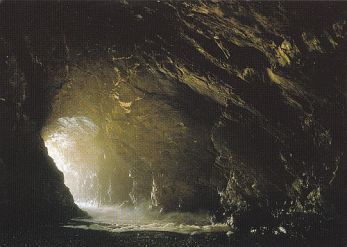
I had a hip operation last Tuesday, and am now recovering at home. It’s difficult living with reduced functionality, relying on crutches and a cocktail of drugs. The best metaphor I can think of to describe my emotional well-being is that of living in a cave. I’ve always been in good health and this is something new for me. I’m learning how to re-think all the most ordinary things that we take for granted during our daily lives. And I’m learning to ask other people for help instead of maintaining my hold on independence, thus bringing out new caring skills in those closest to me.
I hope the next few weeks will be a time of creative thinking. I will post the fruits of this over the next few weeks. Thank you for your loyalty!
Filed under: British psychological suspense writer, creative writing Tagged: caring, cave, creative thinking, health, hip operation recovery, living in a cave, SCSkillman

March 23, 2015
Exciting Times for the People of Leicester, for Those Who Love English History, and for the Power of Story
In the last few years we’ve seen an astonishing and exciting thing here in our country: a relatively small, minority interest group dismissed by some as a gathering of eccentrics, has been triumphantly vindicated in the most extraordinary way. And the Ricardians‘ journey has drawn with them a city, a nation, the sweep of English history, and something powerful that has touched our spiritual roots.
The group is of course the Richard III Society - whose existence I first heard of 15 years ago whilst viewing an exhibition during my walk along the York City Walls - and the triumphant vindication is the discovery of the remains of Richard III, their authentication through a thrilling blend of science and history, and the captivation of millions by Richard’s story, and by the solemn and beautiful ceremonial with which his remains were received into Leicester Cathedral.
I’ve written about Richard III on this blog before, after visiting Bosworth Battlefield myself, and also after reading and reviewing John Ashdown-Hill’s excellent book The Last Days of Richard III and the Fate of His DNA. Now I expect that this book, along with the tourist industry in Leicester and the economic fortunes of that city, will be given an enormous boost by the last few days’ events.
IN my former blog post about Richard III, I wrote this:|
“I cannot read of a historical figure like Richard III without seeing the parallels between his story and fate, and our own experience in this life.
For the basic principles of life do not change.
Nothing and no-one can guarantee any particular outcome for us. Not vice, not virtue. Not piety, not betrayal.
But of one thing I now feel assured by Ashdown-Hill’s book: where there is integrity and focused persistent research, and rigorous dedication, as in the painstaking work of the best historians and genealogists, truth, ultimately, will out.”
How many people must have watched Channel 4’s coverage of the events surrounding and including the reception of the body of Richard III into Leicester Cathedral, with a mix of emotions? Among us there would have been those who were amused, astonished, partly disbelieving, fascinated, excited, uplifted, moved. It was poignant, dramatic, dignified, graceful and solemn.
Certainly we are seeing “a fusion of everybody’s beliefs bound up in a very English moment which allows us to transcend the present moment and is big enough to accommodate all of us.”
Richard III represents and illustrates once again the “what ifs” with which British history is so liberally scattered.
As I watched the coverage of Richard’s remains travelling through the streets of Leicester, packed with onlookers, I saw many people throwing white roses onto the carriage. And I thought that with every white rose thrown, each person was somehow connecting with, claiming their place, inhabiting a story which expresses all the unaccountable mutations of life.
Filed under: book reviews, Books, British, British psychological suspense writer, faith, history, inspiration, life, media, places of inspiration, religion, SC Skillman, SC Skillman Author, spirituality, thoughts, TV programmes, UK Tagged: British history, exciting times, fortune, Leicester, Leicester Cathedral, life, power, Ricardian, Richard III, SC Skillman, spiritual, story

March 16, 2015
Ghostly Encounters, Earthbound Spirits and a Promise of Love
Recently my sister in Australia sent me a set of DVDs – ironically made in England, containing a documentary series on Great British Ghosts narrated by Michaela Strachan for the BBC. The set also included a third documentary, narrated by Paul McGann in a balanced, neutral tone, called Ghosts of the London Underground, and this was by far the most compelling of the three.
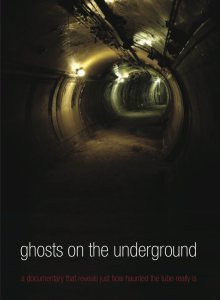
Ghosts on the Underground documentary narrated by Paul McGann
Traditionally in England, sightings of ghosts such as grey ladies in sixteenth century properties can be attributed by sceptics to over sensitive or highly-imaginative people tuned in to the atmosphere whilst staying overnight in Tudor coaching inns.
But the ghosts of the London Underground have a different character. Each story in this documentary is told by a worker whom you would describe as ‘a totally down to earth, practical no-nonsense bloke’ whom many might consider diametrically opposite to the popular image of the type of person who claims to have ghostly encounters. Some of those who told their stories said “I don’t believe in ghosts… but I’ve had an experience I will remember for the rest of my life as something which happened to me which has no explanation.”
Beneath the ticket halls, walkways, escalators and tunnels through which so many people stream, carrying out their daily lives, there is another story: the lingering residue of the souls of people who died terrible and tragic deaths, and somehow imprinted a psychic recording into those tunnels; and not just the ones which have been abandoned.
One day I believe we will fully understand why and how these things happen, but right now, to my knowledge, we have no satisfactory over-arching philosophy to account for these experiences. I shrink from believing that the soul of a human being can possibly be condemned to wander for years close to the place where they had the worst experience of their life on earth. And I cannot fathom why the essence of a person should continue to walk in the place where their life ended, apparently unaware of the fact that they’re dead. Yet living people have had and continue to have experiences which would indicate this as an immediate explanation.
My new upcoming novel A Passionate Spirit contains several ghost stories and an element of the unexplained, and I admit to being fascinated by these phenomena. I used to love Tales of Mystery and Imagination on TV in the past, and not long ago read and reviewed Classic Tales of the Macabre by masters of the ghost story genre: a dazzling display of atmospheric writing from masters of the craft, that demonstrate the art of suspense, with the build-up of horror. The stories in this book are must-reads for anyone seeking to write in the genre nowadays; they range from supernatural to psychological subjects, and all of them are beautifully-written..
However there is another aspect of these experiences. If they are psychic recordings of energy, the fact that they draw the living to engage emotionally with certain tragic life events that happened to individuals in the past, is on one level a good thing.
Of all the millions of beings who’ve been through this world, ghosts are few and far between. And many pass through leaving no mark at all. Nevertheless, there are a few who do indeed leave a mark. And people who’d otherwise be ignorant of their existence are drawn not only to them and to their story but in such a way that they engage emotionally with it.
What we do with this idea depends on a number of factors, not least our worldview.
From a Christian point of view, the fact that every diocese of the Church of England has a “deliverance ministry” (no longer using the term “exorcism”) this presupposes that Christians do actually accept the idea of “earthbound spirits” who need to be released.
Christian theology asserts that each individual soul who has ever lived is loved by God.
In Revelation 21: 3-4 we read these words “One day I will wipe away every tear from your eyes and I’ll take away all the pain you have suffered on this earth.”
This is a promise to hold onto, for those of us who are drawn to investigating these ghostly encounters.
Filed under: About Books I love, Authors I love, book reviews, Books, British, British psychological suspense writer, films, life, literature, London, love, media, musings, religion, SC Skillman, SC Skillman Author, spirituality, thoughts, TV programmes, UK, Writing Tagged: British, Christians, ghosts, God, London Underground, love, psychic recording, Revelation, SC Skillman author, souls, spirit




